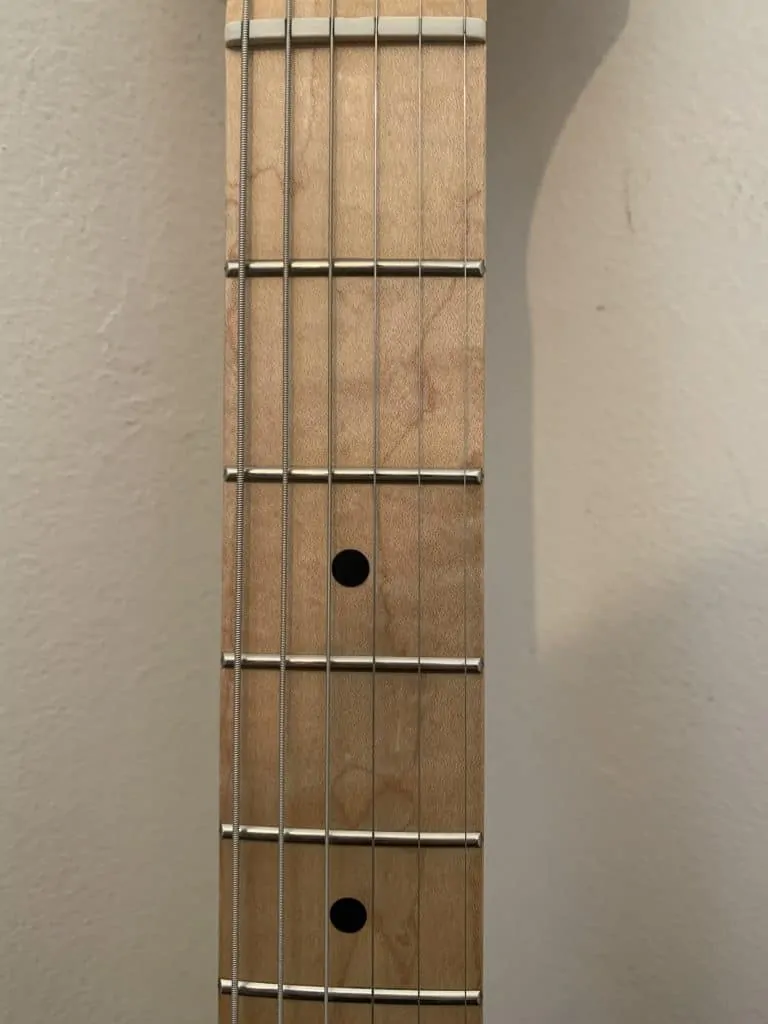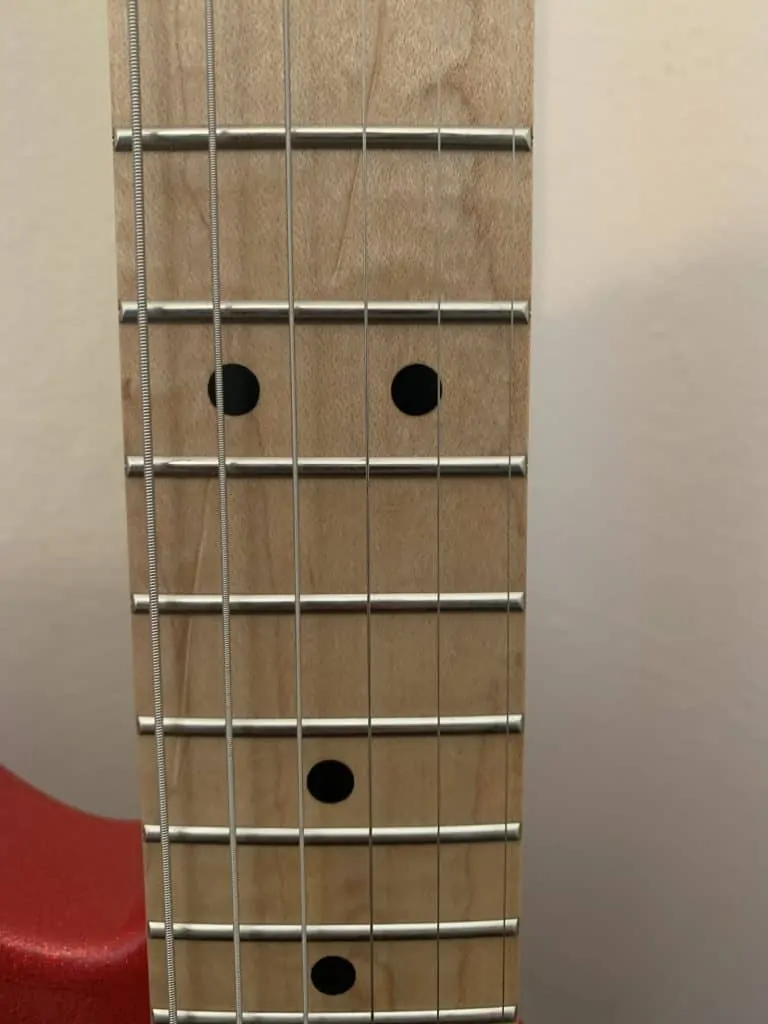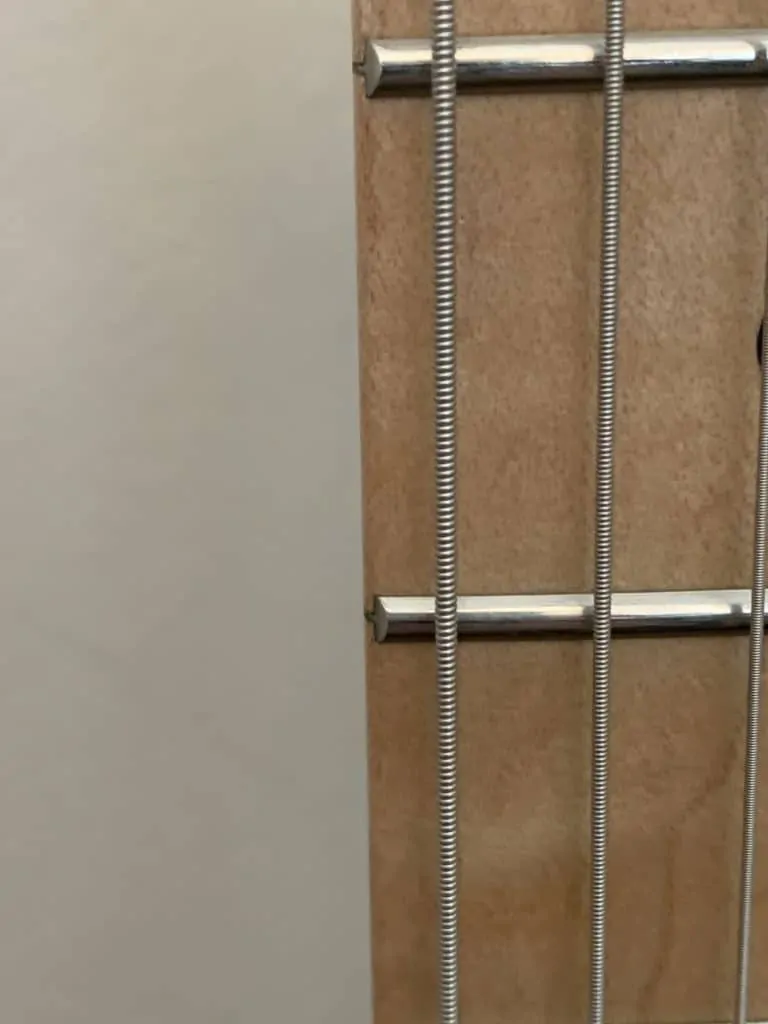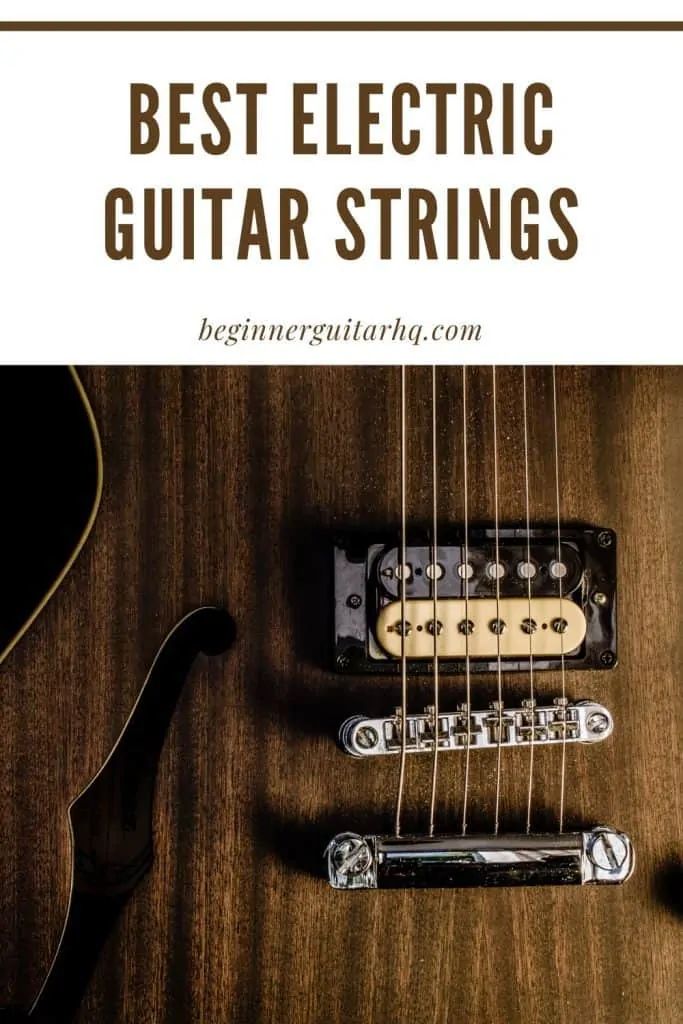We’ve all been there before.
You start to notice that your faithful old ax isn’t quite as bright and cheerful as she usually is, and you’re finding it harder to slide up and down the neck.
Sounds like you need a new set of electric guitar strings.
Now, hopefully, yours aren’t to the point of rusting over yet, but if they are, or they are getting close, you’ll want to get in and change them quick smart.
The question is this though: what are the best electric guitar strings?
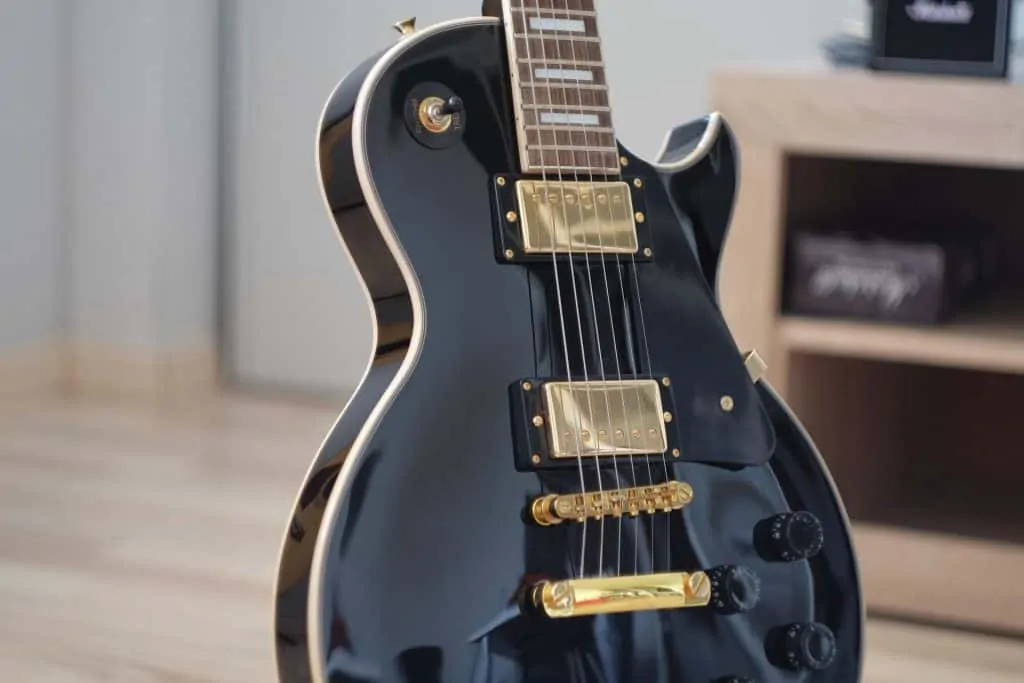
I mean, there are literally hundreds of options, and the price can vary from a handful of change to near on 30 bucks. So what gives?
What makes one set worth five times as much as another, and more importantly, why are there so many different kinds!??
Of course, there are plenty of different brands out there, which does have a hand in pricing. Though you can get guitar strings on the cheap, and I mean really cheap, I’d recommend sticking to reputable brands such as these:
- Ernie Ball
- Elixir
- D’Addario
- Fender
- GHS
- Dunlop
- Rotosound
Without getting into any specifics (which I will shortly), you do get what you pay for when it comes to guitar strings. And it’s not like even the most expensive sets are really that expensive.
$20 for a set that lasts around three months? Try being a drummer and having to shell out for new skins for your drum kit…
Aside from the brand, there are three considerations to make when choosing a new set of guitar strings:
- String gauge
- String winding
- Coatings and metals
Let’s take a look at each of these considerations, then we’ll dive into reviews of the best electric guitar strings.
Contents
Choosing The Best Electric Guitar Strings – String Gauges
A string’s gauge is another name for its thickness, though gauge is really the only term that is used in guitar circles.
Guitar strings are measured in 1/1000th of an inch, so when you see measurements like a 9-gauge string, what this means is it’s 0.009 inches thick.
Of course, as you’ve no doubt realized, your guitar has six strings on it, and they are all different thicknesses, getting gradually thicker as you move from the first string to the sixth.
To make life easier, electric guitar string sets are typically referred to by the gauge of the thinnest string in the pack, so you might have 10-gauge or 12-gauge strings. Many guitarists simply refer to these as ‘10s’ or ‘12’s.
Electric Guitar Strings
Alternatively, you might see some of the best electric guitar strings referred to by their range of gauges, for example, 9-42s. In this case, you can see that the high E string is a 9-gauge, and the low E string is a 42-gauge.
This is important because having, for example, a 9-gauge high E string doesn’t necessarily mean that your low E will be a 42. It’s not uncommon these days for players to use string gauges with a light-top and heavy bottom, such as 9-46s or 10-52s.
String gauges such as these are perfect for guitarists who play in drop tunings.
Here’s a breakdown of the gauges of each string found in common string packs.
| String | e | B | G | D | A | E |
| Super-light gauge | .009 | .011 | .016 | .024 | .032 | .042 |
| Light gauge | .010 | .013 | .017 | .026 | .036 | .046 |
| Medium gauge | .011 | .015 | .018 | .026 | .036 | .050 |
| Heavy gauge | .012 | .016 | .020 | .032 | .042 | .054 |
So, why so many gauges?
Well, there are pros and cons to each, and so certain gauges appeal to players of certain genres, or who are after a particular feel or sound. Often, it’s simply a case of preference based on experience.
Lighter strings gauges are generally a lot easier to play, but that doesn’t mean they are for beginners!
Light gauges are great for those who like to shred or play a lot of bends, as they exert less tension on the guitar and therefore have more ‘give’ in them. Because they are thinner, they tend to break more easily (especially if you’re doing crazy two-tone plus bends), and they produce less sustain than thicker strings.
Lighter gauges may also be prone to fret buzz on certain guitars, especially those with super low action.
On the other hand, heavier gauges offer pretty much the exact opposite.
They are harder to play (and get harder as you go heavier), and make bends and fretting certain notes more difficult. However, they produce more volume and sustain, and are generally known for having better ‘tone’, though personally I think this is a little subjective.
For heavier and lower drop-tunings (I’m talking lower than Drop-D), it’s not uncommon to use very heavy gauge strings. In some cases, it’s kind of necessary to get the right chug and sustain sounds, plus lighter gauges get too floppy and loose when you tune them down too low.

Jazz guitarists often opt for heavier gauge strings due to their tonal benefits, as do many blues players. That said, a lot of blues players use light gauge strings to make bending easier.
Like I said, it’s kind of a preference thing.
As you can see, string gauges affect both the sound and the feel of your guitar. I’d recommend trying a few different gauges, but 10s tend to be a good middle-ground for most players, and you can dial it up or down from there.
Picking The Best Electric Guitar Strings For You – String Windings
Take a look at your electric guitar, and you’ll see that the lower three (or four) strings have a metal alloy winding around them.
String Winding
There are three different styles of string windings that manufacturers apply, and as you probably guessed, the different types affect both playability and tone. They are named after their shape, which makes things pretty simple to remember.
Roundwound Strings
Roundwound strings are by far the most common and most popular form of string winding. The wire that is wrapped around the string core is round itself, which creates little ridges in between each of the windings.
As a result, they produce the most bite and attack of all the string windings, though they also produce a lot more finger noise, and wear down the fretboard more than other types.
Roundwound Strings
Flatwound Strings
By contrast, flatwound guitar strings are wound with a flat wire. As a result, there aren’t any ridges in between each of the windings, so they produce a smoother, darker, flatter sound. They are a lot less sensitive to picking dynamics, and they also feel very different under your fingers.
These are quite popular among jazz and blues guitarists for their smoother sound palette.
Halfwound Strings
Also called groundwound strings, these have a very similar appearance and feel to flatwound strings, and tonally sit somewhere in between flatwound and round wound electric guitar strings.
Electric Guitar Strings – Coatings and Metals
So, you’ve got your gauge sorted, and you’ve decided on roundwound or flatwound strings. There’s still a couple more choices to make.
The first is whether to go with coated or uncoated strings.
Coated strings have a corrosion-resistant coating on them, which helps to protect them from sweat and gunk from your fingers. Gross.
Coated strings tend to last a lot longer than their uncoated counterparts, however, some players find them to sound a little dull fresh out of the packet.
The coating used by the best electric guitar string manufacturers is always improving though, so it’s soon to be a non-issue.
The main decision to make is around the metal used to wind the bottom three strings.
All six strings are made of steel (generally), but your bottom three, the ones that are wound, can be wound with a number of different materials.
Let’s take a look:
| Metal | Pros/Cons/Tone |
| Pure Nickel | Warm and natural, mellow, soft, and smooth. “What they used to use in the golden days”. |
| Nickel-plated Steel | These strings are wrapped with steel that has a nickel plating, rather than pure nickel. A balanced brightness and warmth with more attack. |
| Stainless Steel | Bright and crisp with plenty of attack, lots of sustain, and minimal finger noise. Stainless strings are highly corrosion resistant. Physically harder than other strings, so can be difficult to play. |
| Titanium | Bright and strong. Very durable with a long lifespan. |
| Chrome | Less resonant, very warm, potentially a little dull for some players. Soft and more prone to breakage. |
| Cobalt | A wide dynamic range, super responsive, and very bright. |
The 8 Best Electric Guitar Strings For Every Player Out There
Overall Top Pick Best Electric Guitar Strings: Ernie Ball Regular Slinky
Ernie Ball is probably the biggest name in strings, regularly touted as the manufacturer of the best electric guitar strings on the market.
So, it’s no surprise that these Slinkys are the best of the best on this list.
They use a nickel-plated steel wrap and offer a consistent and even tone right through the frequency range. These babies are 10-46 gauge, which is the perfect starting point for most players in my opinion.
If you’re after something a little lighter, try their 9-42 Super Slinky strings.
Best Light Gauge Electric Guitar Strings: D’Addario NYXL0942
D’Addario is another high profile brand that makes some of the best electric guitar strings on the market.
I’ve been using their strings for over a decade, before switching to Elixirs (which I’ll get to soon). The NYXL range are their upgraded strings that are specifically designed for hair-raising shredders, benders, and whammy dives.
Because constantly bending and stretching the tension of a string inevitably detunes it, lead guitar players have been battling this issue for years.
It’s a problem that’s compounding by the fact that many rock and metal lead players like to use light gauge strings to make fast playing more accessible, and lighter gauges, as you know, break more easily.
The NYXL strings are 131% more stable when using a tremolo, and have a significantly higher breaking point than most strings.
So, if you have issues with breaking strings all the time, check out these guys…
Best Heavy Bottom Electric Guitar Strings: Dunlop Heavy Core Strings 10-60
These strings are amazing, and they are definitely best suited to those of you who like to tune right down.
I’m not talking basic b*tch tunings like Drop D, I’m talking crabcore breakdowns, palm-muted chugs, and nasty panic chords.
Years ago, about the time where super low drop tunings were becoming popular, I was playing in a hardcore band in drop A#.
That’s like Drop D, except the whole guitar is tuned down another four semitones.
This was giving me a massive headache, because with a set of 9-42s on I was basically left with 6 limp rubber bands flailing about. Even moving up to a set of 10-46s didn’t do the trick. The higher strings were okay, not that I was really using them…
The problem was with the three lowest strings. I couldn’t get enough sustain or chug out of them. Then I discovered Dunlop’s Heavycore range, and I was instantly sold.
Their heavy gauge 10-60 strings gave me just the right amount of tension and chug in the low end, though I do remember having to carve out the nut a little bit to fit that .060 gauge in!
The secret appears to lie in their proprietary core to wrap ratio and special core materials. Don’t ask me the details on that though, Dunlop are keeping those cards close to their chest.
To be honest, I don’t care. They do what I need them to, they feel fantastic, and they sound even better.
Best Cheap Roundwound Electric Guitar Strings: GHS Boomers
GHS Boomers may not be the most expensive strings on the market, but they’re an excellent option for those of you looking to get by on a budget.
Being roundwound strings, they offer that classic tone and feel that is all too familiar for most guitar players.
These ones, in particular, are nickel-plated steel, so they’re nice and balanced between brightness and warmth.
If you’re picking these up, I’d recommend picking up a bottle of GHS FastFret, which is a string cleaner and fretboard lubricant that leaves your strings shiny and new every time you use them.
Best Flatwound Electric Guitar Strings: Rotosound Top Tape
After that smooth jazzy tone? Then you’re probably in need of a set of flatwound electric guitar strings.
And what better place to get them from than Rotosound?
Rotosound are a British brand of string manufacturer who got their start designing strings for the likes of Jimmy Hendrix and Geddy Lee, so you know they know what they’re doing.
This specific pack of strings is a set of 12-52s, which is a pretty heavy gauge, but this tends to be appreciated by jazz and blues players. Due to this, the G string (heh) is wound, unlike most string sets.
The sound of these strings is smooth and sweet, without the twang of roundwound strings. Plus, the Monel tape winding eliminates finger noise and gives you a smooth and soft feeling with a rich upper harmonic structure.
Best Nickel-Plated Steel Electric Guitar Strings: Elixir Strings With NANOWEB Coating
Ever since Elixir Strings blew up in the late 2000s, I’ve been a massive fan.
Not only do they offer a tone that lasts like four times longer than most strings, that tone is bloody excellent.
And I’m not the only one raving on about these strings, check out the number of artists that use and love them.
The thing that sets these babies apart and makes them the best nickel-plated steel electric guitar strings is their coating. Elixir offers strings with three different coatings: OPTIWEB, POLYWEB, and NANOWEB.
The OPTIWEB coating has the feel and tone of uncoated strings, but with the endurance of coated strings. NANOWEB strings have a very bright and edgy tone, and POLYWEB strings have one main guitar but can sleep with as many other guitars as the like.
JK.
POLYWEB coated strings are warm and smooth, which is cool, but not really for me.
I’m all about that bright twang, attack, and bite, which means I can dial back the treble or presence a little on my amp and let the guitar speak for itself.
Now, Elixirs do tend to be a bit more expensive than other brands like D’Addario, but I totally reckon they are worth it. Plus, it’s not like you’re changing them every week, especially with the long life the NANOWEB strings achieve!
Best Pure Nickel Electric Guitar Strings: D’Addario EXL110
If the aggressive bite and brightness of nickel-plated strings is proving too much for you, or you simply want to play a guitar ‘who they used to be made’ (eye-roll), then pure nickel strings might be a good choice for you.
The EXL110 set of strings from D’Addario are the best pure nickel guitar strings out there, and they’re relatively affordable too. They’re also the brand’s best-selling set of strings, and considering how many types they have and how many players play them, that’s a pretty impressive feat.
They’re roundwound strings so they have the feeling you know and love, but they have a hexagonal core which gives the string an element of robustness.
Give ‘em a try, I’m sure you’ll be blown away.
Best Stainless Steel Electric Guitar Strings: Fender Stainless Steel 350’s
One of the biggest problems with guitar strings is that over time, they corrode. That’s primarily a result of the sweat and gunk from your fingers, which is basically like acid and is not great for metals.
For those of you who play hard and fast, or are just excessively sweaty beings, this can cause a huge problem. It ends up meaning you’re replacing strings every few weeks, which can get a little expensive, but is also just plain annoying.
The answer?
Stainless steel strings.
These guys are highly corrosion resistant, which will mean they’ll last longer. Because they are made of a different metal than what you’re probably used to, they will sound a little different.
Stainless steel guitar strings are very bright and crisp, and have tonnes of sustain. They’re also pretty low on finger noise, which is always nice. You might notice that they’re a little harder to play though, as the metal itself is physically harder, but you’ll get used to it.
Frequently Asked Questions
How Do I Know When I Need To Change Guitar Strings?
There are a number of reasons that could point to a need to change strings and you might experience all, some, or just one of them, depending on a number of factors.
Here’s what to look out for:
- Your strings keep going out of tune
- Your tone is dull and muddy
- Your strings feel harsh and a little rusty
- Your strings are discolored
- The string wrap is starting to unwind
- You have no idea when you last changed them!
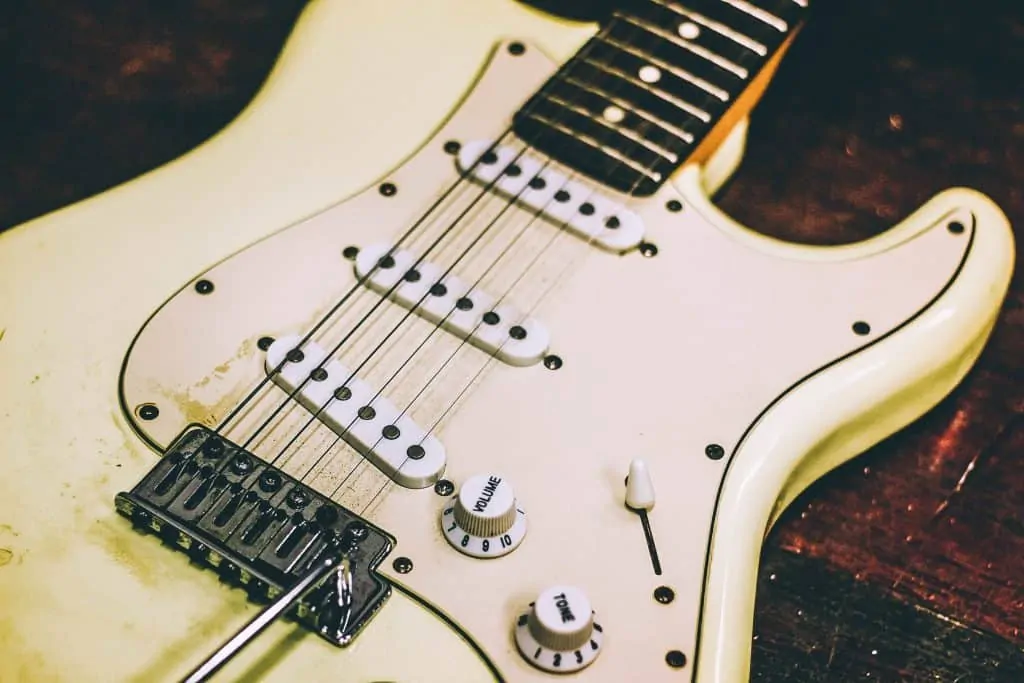
How Often Do I Need To Change My Guitar Strings?
As a general rule, you should change your guitar strings every 3 months. If you play regularly, maybe even every month. Again, it depends on a bunch of things, like:
- How often you play
- How hard you play
- The types of strings you use
- How you store your guitar
- How sweaty your hands get
- If you smoke or play in smoky environments
- If you change tunings a lot
- If you do a lot of bends or abuse the whammy bar
Should I Change All Guitar Strings Or Just One?
From time to time, a string will break.
Though this shouldn’t be happening regularly, it does happen. And it leaves you wondering whether you need to change all the strings or just that one.
As with everything, the answer is ‘it depends’.
Consider things like how old the set of strings is, and what happened when it broke, e.g. did you bend it too far?

If it happened because the strings are old, then you should change them all. Not only because it’s a sign that they need replacing anyway, but if you have five old strings and one brand new one, you’re going to have a weird tonal difference.
That said, from time to time new strings break as well. So it’s always a good idea to have a spare set just in case!
Conclusion
All in all, it really comes down to personal preference. And I’m guessing if you’re here, then you probably don’t have one.
In that case, my recommendation would be to grab a few different sets based on what you think sounds like you, and go from there.
I’d highly recommend trying Elixir, Ernie Ball, or D’Addario as your first options as far as brands go. From there, maybe get a set of 9s and a set of 10s so you can feel the difference, try out a couple of different windings and metals, and start narrowing it down.
Remember, this doesn’t have to be a one-day job, you’re going to be playing for years to come (hopefully), so you’ve got plenty of time to figure out which are the best electric guitar strings for your playing style and preferences.

